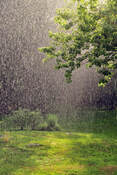 One of the countless proofs of the divine nature of the Quran is related to the base letters of Arabic words, their associated meanings and their precise usage in the Quran. No other writing or speech in the Arabic language can compare! An example of this are 3 words used in the Quran that could be considered synonyms for the word rain in English. الودْق المطر الغيثI have already covered the word الودْق in a 2 part video presentation which can be watched here in the sample lessons. Let us examine the word المطر and identify the meanings of it in classical dictionaries as well as the ahadith of the Prophet (peace be upon him). Lisanularab says: المَطَرُ: الماء المنكسب من السَّحاب المَطَر ( Al- Matar) is the rain obtained from the clouds  In a hadith narrated in both Sahih Al-Bukhari and Sahih Muslim, The Prophet ( peace be upon him ) is quoted as saying, when it rained: مُطِرْنَا بِفَضْلِ اللهِ وَ رَحْمَتِهِ “It has rained by the bounty of Allah and His Mercy” What is miraculous however, is the way the Quran uses this word. It doesn't use it to mean the rain from the clouds, other than one instance and for a specific reason that I will explain later on What makes the Quran unique ?Islamic scholars such Imam Suyuti believe that the language of Quran, every word, sentence structure, ayah position etc. has been perfected. It is as if the Arabic language was specifically created for the Quran and the Quran alone. This is why 2 words in the Quran can never mean the same thing. In the Quran, words associated with the 3 letter root of المطر i.e م ط ر , occur for punishment and harm. Examples in the Quran include: وَأَمْطَرْنَا عَلَيْهِم مَّطَرًا فَانظُرْ كَيْفَ كَانَ عَاقِبَةُ الْمُجْرِمِينَ And We rained upon them a rain [of stones]. Then see how was the end of the criminals. Quran 7:84 وَلَقَدْ أَتَوْا عَلَى الْقَرْيَةِ الَّتِي أُمْطِرَتْ مَطَرَ السَّوْءِ And they have already come upon the town which was showered with a rain of evil. Quran 25:40 The use of Al-Istiqaaq Al KabeerThis Arabic science involves finding common meanings in words with the same or similar base letters. There is little literature available on this science but it has been used by scholars of the past (like Ibnu Al-jinni and Al khaleel Ibn Ahmad) and present scholars like Ibn Ashoor to derive further nuances related to words that have the same base letters. It should be noted that no other speech or text uses words with this precision, not even the authentic ahadith of the Prophet (SAW). If we rearrange the root letters of م ط ر we obtain the root ط م ر Words on the root ط م ر mean is to conceal, bury something as well as to bury a corpse. We have these 2 entries from classical dictionaries Lisanularab and Qamus Al Muheet طَمَرَ البئرَ طَمْراً: دفَنها He buried a well i.e. He covered it up. as well as الطَّمْرُ: الدَّفْنُ burying a corpse Therefore we obtain a nuance that adds further meaning to the word المطر In the Quran, this rain is used for the punishments that befell the previous nations that covered up and buried those who were destroyed. The one instance in the Quran where it is used for an actual rainThere is only one ayah that doesn't use it for a punishment from the sky and this is found in the Surat Al Nisa 4:102. وَلَا جُنَاحَ عَلَيْكُمْ إِن كَانَ بِكُمْ أَذًى مِّن مَّطَرٍ أَوْ كُنتُم مَّرْضَىٰ أَن تَضَعُوا أَسْلِحَتَكُمْ ۖ وَخُذُوا حِذْرَكُمْ ۗ إِنَّ اللَّهَ أَعَدَّ لِلْكَافِرِينَ عَذَابًا مُّهِينًا And there is no blame upon you if you are harmed by rain or are ill, for putting down your arms ( during battle), but take precaution. Indeed, Allah has prepared for the disbelievers a humiliating punishment. Quran 4:102 In this case it's used for harm that an injured soldier gets if exposed to the rain when carrying his weapon. Obviously it's not referring to a sting or slight discomfort but is referring to a major wound during a battle where he fears harm or death. The soldier therefore is given permission to conceal the wound and not expose it to the life threatening rain. SubhanAllah!!! By Nabeel Ali Alkhalidy
4 Comments
Saad Karim Leghari
12/14/2019 17:31:23
Praise be to Allaah...
Reply
J. Michael
12/29/2019 16:46:02
اسلام عليكم
Reply
Leave a Reply. |
Nabeel AlkhalidyHead teacher of the Sibaway Institute. Archives
February 2022
Categories
All
|
THE SIBAWAY INSTITUTE |


 RSS Feed
RSS Feed

